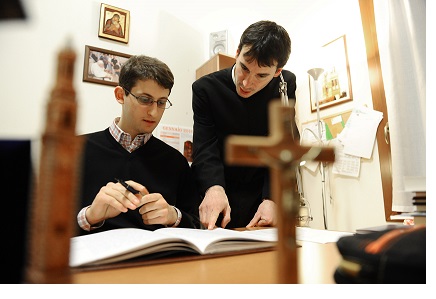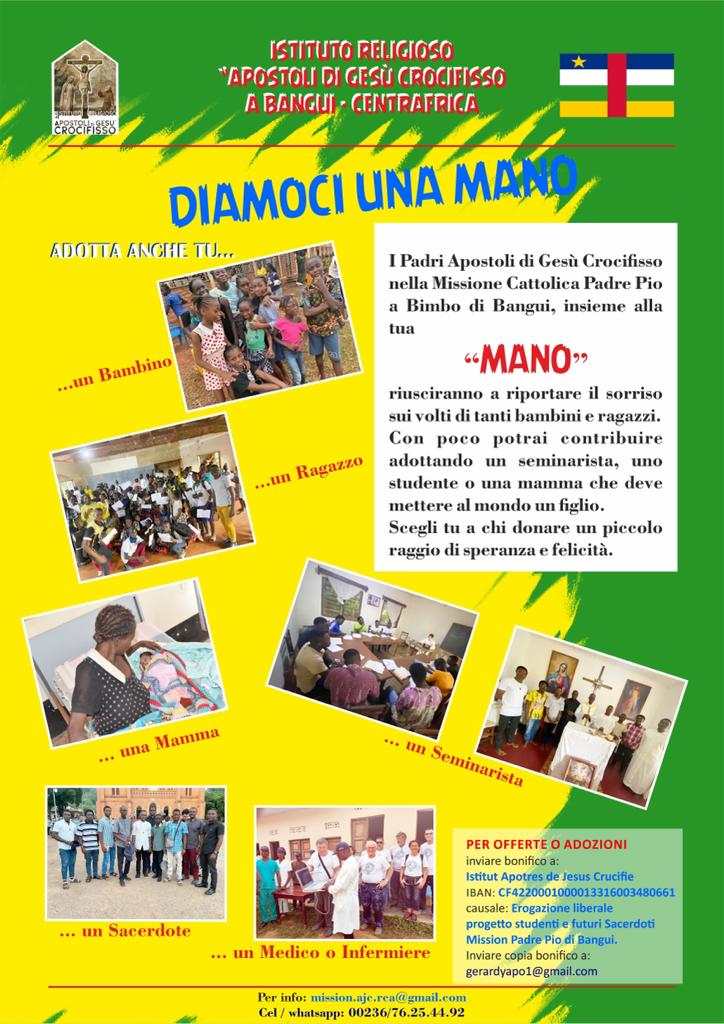Scritto da Rodelio I. Mapula | Categoria: Formazione | Pubblicato il 08/07/2024
 Student life plays one aspect of religious life especially for those candidates for priestly ministry and for those pursuing further studies. In a person's religious life, being a student is a special and thrilling period. It is a phase of discovery, training, and maturation, but it's also fraught with difficulties. As a student dive deep in studies, one faces a variety of challenges that will test one’s fortitude, tenacity and flexibility. These challenges can come to test how we treat with equilibrium other aspects of religious life such as prayer, study, apostolate, community and leisure. How can one maintain equilibrium in the face of this intricate and varied experience such that no facet of religious life is overlooked or compromised?
Student life plays one aspect of religious life especially for those candidates for priestly ministry and for those pursuing further studies. In a person's religious life, being a student is a special and thrilling period. It is a phase of discovery, training, and maturation, but it's also fraught with difficulties. As a student dive deep in studies, one faces a variety of challenges that will test one’s fortitude, tenacity and flexibility. These challenges can come to test how we treat with equilibrium other aspects of religious life such as prayer, study, apostolate, community and leisure. How can one maintain equilibrium in the face of this intricate and varied experience such that no facet of religious life is overlooked or compromised?
First and foremost, students need to remember that, above all else, prayer remains a mysterious transforming power which embraces all realities (FLC, 19). It is a known fact that our prayer life will be significantly impacted by our time in seminary. The seminary can feel like a strain or diversion from a life of devotion at times because of its demands. Students frequently struggle with creating this time and place to talk to God and listen to him. How can we maintain our prayer lives faithfully in the face of these challenges? As a seminarian/student, we search for self-identity and a sense of mission in life. The spiritual formation of a seminarian/student aims to awaken and develop in him a sense of the sacred in life so that he could be a good Christian and be able to crystallize his decision to follow Jesus Christ in the ordained ministry (RFSN, 205). As "Apostles of Jesus Crucified," students must understand that prayer is a time to be with the Lord so that he can work and that he can come into one’s life to comfort and lead in spite of distractions and weariness (FLC, 13). As our constitution says (quoting Can. 663, §1), “prayer is to be considered as essential breathe of the soul and the best means to ascend and to lift up the others and all everything to God.”The student have to love, particularly the liturgical prayer: the basis, food and expression of one’s piety from which he will draw inexhaustible sanctifying energies for himself and for the others (Art. 78). He has to cultivate both community and personal prayer. If the student is to continue to be zealous and directed in the apostolate, he needs to have these regular times of solitude and intimacy with God. These then turn into a chance to look for and find the Lord's presence and activity in one’s life.
Second, academic and intellectual formation can be regarded as a component of human, spiritual, and pastoral formation. The intellectual formation of the seminarians/students, however, finds its unique justification in the very nature of the ordained ministry and the mission of evangelization (RFSN, 388). It is definitely a reality that one cannot take lightly the demands of study. Students/seminarians are faced with academic challenges such as heavy workloads, paper works, quizzes and intense exams. Why is it that making time for intellectual formation is so important? We are called to mind that for the sake of being able to proclaim the Gospel in a credible, inviting and convincing way, seminarians/students need a high level of intellectual formation. This is true especially when one realizes that the Gospel is to be preached to a world beset by fresh and complicated questions and problems emerging from scientific, technological, ideological and cultural changes. For that reason, the Gospel message must be explained in a manner and a language that can deeply engage contemporary men and women in their experiences (RFSN, 390). However, Pope Francis in one of his meetings with the rectors and students of the Pontifical Universities and Colleges in Rome warned students against ‘academism’, saying that it is “dangerous” because one might be getting a degree but does not have community life or might not take care of his spiritual life or his apostolic life. Consequently, we have to keep in mind that intellectual formation is to be integrated with a personal experience of God whose mystery is not only being studied but also intimately experienced (RFSN, 389).
Third, the religious has the prophetic task of recalling and serving the divine plan for humanity (VC, 73). It is important to note that a member, especially those who are studying for priestly ministry, must carry out his apostolate diligently despite student demands. The purpose of the apostolate is to bring humanity back to union with God and to unity among itself, through divine charity (FLC, 2). We strive to fulfill our mission and apostolic aim while battling the numerous and urgent issues related to other facets of religious life. Seminarians/students should never waver from their resolve to address the needs of the people both body and soul, working with zeal in the fields determined by the founding charism. As students/seminarians, we are not exempt from fulfilling the specific apostolates outlined in our constitution. We are called to bring the Word of God to the groups, to the families, to individuals and to the people, and approaching with a helpful heart all those who are suffering physically, morally, spiritually, in order to relieve and raise their pain into prayer to the glory of God and for the salvation of the souls (Art. 91). By this commitment, we are able to repeat this love of Christ that impels us to consolidate and expand the Kingdom of Christ, bringing the proclamation of the Gospel (VC, 78).
Fourth, fraternal life plays a vital role in one’s religious life. As a religious community, we are a living organism of fraternal communion, called to live as animated by the foundational charism (FLC, 2). Because of this, a seminarian/student needs also to prioritize the community aspect of sharing and moving forward with his brothers. When faced with academic demands, a person could become preoccupied with his own company and neglect his responsibilities in the community. The deeply felt need to enhance fraternal life in community is accompanied by a corresponding need for communication which is both fuller and more intense (FLC, 29). As a community, we have to keep in mind that we live in common. There are community demands that seek our presence. Various expressions of fraternal and community life has to be considered such as shared prayer, work, meals and spirit. These will allow every member to thrive and be formed in the example of the first Christian community. Keeping this fraternal life, we seek to value communication and we concretely share this by our meetings and gatherings, recreation and sports. These create closer relations, nourishes a family spirit and a sharing in the concerns of the institute, and brings religious closer together around our common mission (FLC, 30).
Lastly, leisure and rest during our free time is vital for our souls. As students, we are confronted with the different aspects of religious life and we have to give ourselves a break from these demands. It releases us from the trap of putting too much emphasis on our work and neglecting to take breaks for relaxation. But, let us not lose sight of the fact that we still need to use this free time to make connections between our faith and our daily lives.In order to keep creating new versions of ourselves, we should enjoy our leisure time. It is not always necessary to spend free time with people. It ought to include some time spent alone ourselves, which aids in our spiritual development and serves as a prelude to our fellowship with others. We sometimes need to take a break to recharge our minds, bodies, and souls in order to fulfill the obligations that come with being students as we are swamped with apostolates, community responsibilities, and academic tasks.
Sometimes, we are grappling with all these things, seeking to find the balance of each and every aspect as a student. However, Jesus Christ teaches us one secret to maintain this margin and perspective, and that is simply making prayer a priority and the rest will follow. Notice that other facets has its realization in a cultivated spiritual life. Academic life is nourished by prayer. Apostolate has its foundation in prayer. Fraternal life is built up by praying together. Leisure has to keep in touch with prayer. The pressure as a student to juggle multiple responsibilities can feel inundating that is why we have to allocate our time accordingly, that is, setting boundaries. Our horarium, or daily schedules, can be very helpful in making this a reality. All we need to do is remain true to each and every dimension in order to keep the most important aspects in mind. We must make an effort to be models of harmony and order as we organize a schedule. Our own needs are respected by these schedules. It truly helps us to live out our calling every day and to identify the things that are typically necessary. As St. John Paul II reminds us, “one must arrange one’s life so that everything praises God.”
---------------------------------------------------------------------------------------------------------------------
Abbreviations:
FLC- Fraternal Life in Community
RFSN- Ratio Formationis Sacerdotalis Nationalis (For the Philippines)
VC- Vita Consecrata






